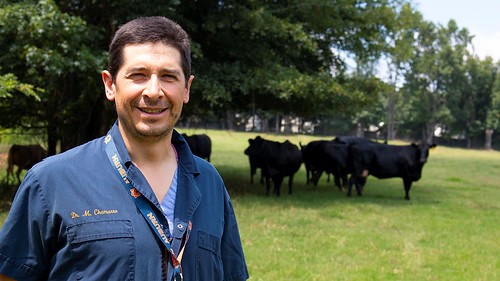Objective is to develop vaccination protocol to reduce morbidity and mortality of nursing beef calves affected by BRSV.
August 1, 2019

Auburn University’s Production Agriculture Research (PAR) grants program has announced funding for a series of projects that includes fighting deadly respiratory diseases in calves.
“The main goal of the program is to support research that will provide immediate solutions to stakeholder identified problems in Alabama,” said Henry Fadamiro, associate dean for research for the Auburn College of Agriculture and associate director of the Alabama Agricultural Experiment Station (AAES).
As agricultural research dollars become increasingly scarce, it’s more important than ever for funded projects to provide timely solutions to real-world problems, Auburn said, noting that the proposals approved for PAR grants must undergo a rigorous review before being approved. Research proposals from faculty are reviewed in an intensive process involving stakeholders and scientists.
“The first stage is a relevance review panel, including representatives from the Alabama Farmers Federation and the Alabama Cattlemen’s Assn.,” Fadamiro said. “We ask them to rate the relevance of the proposals from high to no relevance.”
This is followed by a technical review, where a panel of experts in the various fields of research rate the scientific merits of the proposals. In other words, they determine whether or not, if funded, the proposal likely will be successful, Auburn said.
Auburn said six proposals made the final cut this year, with a total funding for all projects of $285,000. Since the program was begun in 2017, 30 projects have been awarded more than $1.3 million.
The grants are administered through AAES with Hatch funding from the U.S. Department of Agriculture's National Institute of Food & Agriculture and matching state appropriations. Many of the two-year, $50,000 PAR grants support combined research and extension projects to address current farming problems in a timely manner through applied research, Auburn said.
“The stakeholders are very happy with the process, and we’re now beginning to see significant outcomes from the initial PAR grants that were awarded two years ago,” Fadamiro said.
“The AAES Production Agriculture Research awards have direct impacts for Alabama producers,” said Erin Beasley, executive vice president of the Alabama Cattlemen's Assn. and a member of the grant review panel. “The projects have a focus for on-farm issues and practical solutions to provide farmers answers to questions affecting their bottom line. I was pleased to see two beef cattle projects awarded this year addressing forage and animal health problems that will improve the cattle industry in Alabama.”
One beef cattle-related PAR initiative this year will be used to help fight the leading cause of death in nursing beef calves older than three weeks of age. Bovine respiratory syncytial virus (BRSV) is a common cause of severe respiratory disease in young calves. The condition costs the nation’s cow/calf industry an estimated $165 million annually, Auburn said.
The research proposed will evaluate two different approaches to prevent BRSV infection in nursing beef calves, said AAES researcher Manuel F. Chamorro, assistant professor of food animal medicine and surgery in the Auburn College of Veterinary Medicine.
“The objective of this research is to develop a vaccination protocol that will reduce morbidity and mortality of nursing beef calves affected by BRSV in cow/calf beef operations,” Chamorro said. “We’ll accomplish this by developing an effective vaccination protocol that will reduce BRSV-associated disease in beef calves before and after weaning.”
Additionally, researchers expect to change current strategies of vaccinating pregnant beef cows and newborn calves to reduce the incidence of viral respiratory disease in nursing calves.
Three other PAR grants that focus on animal agriculture, according to the announcement, include:
* Characterization and alleviation of harvest and transport-induced stress in hybrid catfish, led by Joe Tomasso, director and professor of the Auburn School of Fisheries, Aquaculture & Aquatic Sciences.
* Nutrigenomics approach to dampen the negative effects of endophyte-infected tall fescue on beef cow/calf performance, led by Sonia Moisa, assistant professor of the Auburn department of animal sciences.
* Comparison of traditional selection with DNA biotechnologies to enhance disease resistance in catfish, led by Rex Dunham, professor of the Auburn School of Fisheries, Aquaculture & Aquatic Sciences.
You May Also Like

.png?width=300&auto=webp&quality=80&disable=upscale)

